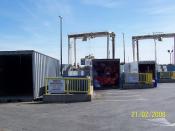Saves jobs is one of the fatally flawed arguments which I am going to make further discussion in this part. Like "fatally flawed" sounded, saves job arguments dose have a defect on it. Let's take a clearly view about saves jobs. The argument is: When we buy shoes from Brazil or shirts from Taiwan, US workers lose their jobs. With no earnings and poor prospects, these workers become a drain on welfare and spend lass, causing a ripple effect of further job losses. The proposed solution to this problem is to ban imports of cheap foreign good and to protect US jobs. The idea that buying foreign goods costs domestic jobs is wrong. There're some reasons to explain why it has flawed:
- It destroys some jobs and creates other better jobs.
- It also increases foreign incomes and enables foreigners to buy more domestic production.
- Protection to save particular jobs is very costly.
Free trade dose cost some jobs, but it also creates other jobs. It brings about a global rationalization of labor and allocates labor resources to their highest value activities. Because of international trade in textiles, tens of thousands of workers in the US have lost jobs because textile mills and other factories have closed. But tens of thousands of workers in other countries now have jobs because textile mills have opened there. And tens of thousands of US workers now have better paying jobs than textile workers because other export industries have expanded and created more jobs than have been destroyed.
Imports create jobs. They create jobs for retailers that sell imported goods and for firms that service those goods. They also create jobs by creating incomes in the rest of the world, some of which are spent in imports of US made goods and...


